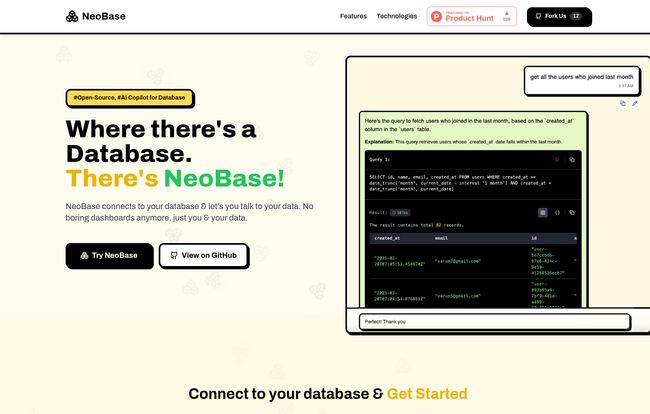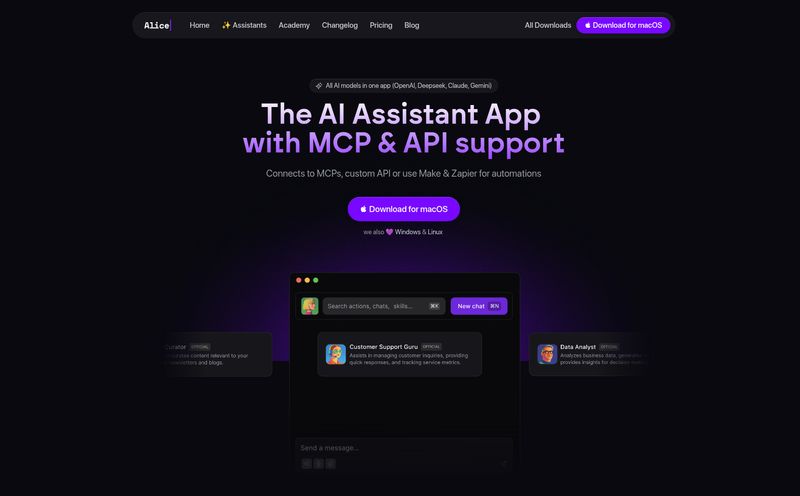We've all been there. Staring at a database schema that looks like a Jackson Pollock painting, trying to remember the exact SQL syntax to join three tables just to find out which customers in Ohio bought a red widget last Tuesday. It’s a pain. For developers, it's a constant context switch. For product managers or business analysts, it’s a roadblock that means bugging an engineer and waiting.
For years, we've just accepted this as the cost of doing business with data. But what if you could just... talk to your database? Ask it questions in plain English? Well, I stumbled across a tool called NeoBase that promises just that, and as someone who has spent more hours than I’d like to admit wrestling with PostgreSQL, my curiosity was definitely piqued.
This isn't just another shiny SaaS tool with a questionable privacy policy. This one's different. It's open source, self-hosted, and it looks like it was designed by someone who actually enjoys using a terminal. So, is it the real deal? Let's get into it.
So What is NeoBase, Really?
At its heart, NeoBase is a translator. It’s a Rosetta Stone for your data, turning your normal, everyday language into optimized, ready-to-run database queries. You connect it to your database, open the interface, and start asking questions. No more `SELECT FROM users u JOIN orders o ON u.id = o.user_id WHERE...` you get the idea.
Instead, you can just type: “Show me all users from California who have spent more than $500 in the last month.”
NeoBase takes that request, chews on it with the help of an AI model like GPT-4 or Claude, and spits back the precise SQL query to get your answer. But the killer feature, for me at least, is that it's self-hosted and open source. In an age where we're all a bit paranoid about where our data is going, this is huge. Your sensitive customer data isn't being shipped off to some third-party server in a data center you've never heard of. It stays on your infrastructure, under your control. That alone is a massive win.
And can we talk about the design for a second? It has this slick, 'Neo Brutalism' vibe. It's clean, functional, and honestly, a breath of fresh air compared to the generic corporate-blue dashboards we see everywhere.
Who Will Get the Most Out of NeoBase?
I can see this being a game-changer for a few different groups of people.
- Software Developers: You know those moments when you just need to quickly scaffold a query or inspect some data? NeoBase is like having a junior dev on call 24/7. It can handle the boilerplate, suggest optimizations, and speed up your workflow significantly. It’s not going to replace your deep database expertise, but it’s a fantastic co-pilot.
- Product Managers & Business Analysts: This is where it gets really interesting. NeoBase empowers the non-technical folks to get their own answers. No more waiting in a backlog for the engineering team to pull a simple report. This frees up everyone's time and enables a much faster, data-driven decision-making cycle.
- Data Science Teams: For initial data exploration and hypothesis testing, being able to quickly query and visualize data without writing complex code is a massive boon. It lowers the barrier to just playing with the data, which is where some of the best insights come from.
Basically, if you have data and you need answers, NeoBase is trying to make your life easier.
A Look at The Core Features
A tool is only as good as what it can do. Let’s break down the key features that make NeoBase tick.
From Plain English to Optimized SQL
This is the main event. The AI-powered conversation is the core of NeoBase. But it's not just about generating any query. The platform also offers optimization suggestions. It analyzes your schema and your question to create a query that's not just correct, but also efficient. I’ve seen some gnarly, slow queries written by humans (and, uh, myself), so having an AI partner to nudge you in the right direction is incredibly valuable.
Your Data, Your Server, Your Rules
I mentioned this before, but it bears repeating. The fact that NeoBase is self-hosted is a cornerstone of its appeal. You deploy it on your own infrastructure. This means you have complete control over security and data privacy. For any company dealing with PII, financial data, or any other sensitive information, this isn't just a feature; it's a requirement. Being open source also means you can inspect the code yourself, customize it, and contribute back to the project. You're not locked into a vendor's ecosystem.

Visit NeoBase
Plays Nice with Your Favorite Tech
Flexibility is written all over this tool. On the database side, it’s not just a one-trick pony. It supports some of the most popular databases out there: PostgreSQL, MySQL, Yugabyte, and ClickHouse. On the AI side, it lets you plug in your LLM of choice, including models from OpenAI, Anthropic (Claude), and Google (Gemini). This is smart because it means you're not tied to a single AI provider and can choose the one that offers the best performance or price for your needs.
So How Does It Actually Work?
The workflow is refreshingly straightforward, which I appreciate. No ten-step setup wizard or confusing configuration files to get started (well, not too many).
- Connect Your Database: First, you securely provide the credentials for your database. The tool needs this to understand your schema—the tables, columns, and relationships.
- Ask in Your Language: You type your question into the chat interface. No special commands or syntax needed.
- AI Generates the Query: The AI model gets to work, crafting an optimized SQL query based on your request and its knowledge of your schema.
- Execute and See Results: You can then execute the query directly from the interface and see the results, often presented in a clean, easy-to-read table. They even have some basic data visualization, which is a nice touch.
The Real Deal: Pros and Cons
No tool is perfect, right? After playing around with it and thinking about its real-world application, here’s my breakdown of the good and the not-so-good.
What I Really Like About NeoBase
The pros are pretty compelling. The ability to query with natural language is obviously the star of the show, simplifying life for everyone. The AI-driven optimization is a genuinely useful feature that can save on database costs and improve performance. And, of course, being open source and self-hosted provides a level of control and security that you just don't get with most commercial tools. It democratizes data access without compromising on security.
A Few Things to Keep in Mind
Now for the reality check. This isn't a magic wand. There's an initial setup and configuration process. If you're not comfortable with spinning up a server or managing a Docker container, you might need some help. Its performance is also directly tied to the underlying LLM you use. If your chosen AI model is slow or not very good at generating SQL, your experience with NeoBase will suffer. Its a direct relationship. Finally, for really complex, multi-layered business logic, you'll probably still need an experienced data engineer to write a custom query. But for 80% of the day-to-day questions? This thing looks more than capable.
Let's Talk Money: The "Free" in Open Source
NeoBase itself is free to download and use, which is fantastic. But "free" as in "free puppy," not "free beer." You need to account for the operational costs.
- Hosting Costs: You'll need a server or a cloud instance to run it on. This could be a small DigitalOcean droplet or an AWS EC2 instance, but it's not zero.
- LLM API Costs: This is the main one. You need to connect NeoBase to an AI model via an API key, and you'll be paying that provider (like OpenAI or Google) for every query you make. The costs can be very reasonable, but for a team making hundreds of queries a day, it's something you'll need to budget for.
Still, when you compare this to the per-seat licensing fees of many commercial BI tools, the total cost of ownership could be significantly lower, especially for smaller teams.
Frequently Asked Questions
- What is NeoBase & Why was it made?
- NeoBase is an AI-powered database assistant. It was created to solve a common problem: making database interaction easier for everyone, not just SQL experts. It translates plain English questions into optimized database queries.
- Which databases does NeoBase support?
- Currently, it supports a solid lineup of popular databases, including PostgreSQL, MySQL, Yugabyte, and ClickHouse. The team seems to be actively adding support for more, which is great to see.
- How does NeoBase ensure the security of my data?
- This is one of its biggest strengths. Because it's self-hosted, your database credentials and sensitive data never leave your own infrastructure. You control the entire environment, unlike cloud-based tools that process your data on their servers.
- Which LLM clients does NeoBase support?
- It's built to be flexible. You can connect it to leading AI models from OpenAI (like GPT-4), Anthropic (Claude), and Google (Gemini). You choose the brain that powers the operation.
- Is NeoBase really open source?
- Yes, it is. You can find the source code, inspect it, modify it for your own needs, and even contribute to its development. This transparency is a huge plus for trust and customization.
- Can I deploy NeoBase on my own infrastructure?
- Absolutely. In fact, that's the whole point. It's designed specifically to be self-hosted, giving you full control over your data and deployment environment.
My Final Take: Is NeoBase Your Next Database Buddy?
So, what’s the verdict? I'm genuinely excited about tools like NeoBase. They represent a significant shift in how we interact with the foundational systems of our businesses. The idea of a "database co-pilot" is powerful, and NeoBase's focus on self-hosting and open-source principles makes it particularly compelling for developers and security-conscious organizations.
Is it going to put all data engineers out of a job tomorrow? No. But will it make them more productive and empower their non-technical colleagues to be more self-sufficient? I absolutely think so. If you're tired of the SQL bottleneck and you value data ownership, you should definitely give NeoBase a look. It might just be the friendly database assistant you've been waiting for.
Reference and Sources
- For more information and to access the open-source code, you can typically find projects like this on platforms like GitHub. A search for "NeoBase AI Database Assistant" should point you in the right direction.
- PostgreSQL Official Website
- OpenAI



